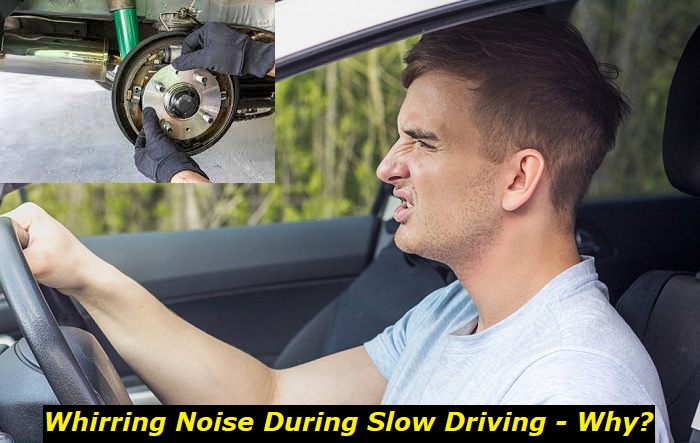Whirring noise when driving at low speed may mean that there is an issue with the AC compressor, water pump, power steering, high-pressure fuel pump, or other units. The whirring sounds may also be made by faulty suspension parts, bearings, and different connections. You may not be able to easily locate the problem just by listening for that whirring from the vehicle's cabin.
Engine noises highlights
- Level of importance:High
- Commonreasons:All kinds of various problems, hard to list promptly
- DIY inspection:Possible but may be complicated
- DIY repair:Impossible, in most cases
- Price for repair:$150 - $1,000
- Can you drive?Usually, yes
- Ways to fix:Locate the source for the sound and repair the system that needs help

Whirring noises - let's register some symptoms
Before you rush to your mechanic or to the dealership, you should register the main symptoms of the problem. The more you report, the less time they will need to locate the problem. This will reduce your costs because diagnostics will take a solid part of the budget for the repair.
So, here's how you should act when you first hear these whirring noises in your car:
- identify when exactly you hear them - when standing or driving, low or high speed, etc.;
- try to identify the most possible place for the whirring noise to come from;
- notice if your vehicle changes its behavior like steering or acceleration;
- check if the AC is still working;
- check whether you see some warning lights or error messages on the dash of your vehicle.
This simple and quick check will help you give all the needed information to the mechanic who will diagnose the vehicle. And most likely, this will save their time and reduce your costs. Also, this will reduce the overall time for repair because finding the reasons for this problem will be much easier.
What are the common reasons for whirring noises in your vehicle?
When something is whirring, you can deduct that this comes from a rotating unit. In most cases, this will be something with a pulley or a bearing in it. The pulley or bearing can go bad after some time and eventually start making noises. It also means that the faulty pulley or bearing are not doing their job like they have to do.
For example, a bearing may have fallen apart and now it's not allowing the axle it's sitting on to rotate properly. When rotating, it creates unnecessary resistance, causes overheating, loads the engine or other parts of your car, etc.
I've decided to list the most obvious reasons for whirring noises when driving slowly:
1. Alternator bearings
Your alternator's rotations depend on the RPM of the engine. When you drive slowly and the RPM of your engine is low, the alternator is also rotating slowly. It means you can hear some noises from faulty bearings. When the engine is higher than 3000 RPM, the noises may be gone.
Although most often the alternator makes whining noises, it may go whirring sometimes. You hear like something is rotating with an effort and is not going to work long that way.
Locating the problems with the alternator is not that easy. You most likely will need professional help for this. I don't recommend ignoring issues with the alternator because this can lead to even worse problems.
2. Water pump
Every internal combustion engine has a water pump. It's located inside the engine and is often driven by the timing chain or belt. The pump is extremely important because it helps coolant circulate inside the engine and radiator to ensure that the engine can maintain the proper working temperature.
It's extremely hard to hear the water pump whirring and if you do hear it, things are quite bad. It's important to replace the pump before it fails. You won't be able to drive with a broken pump more than a mile till your engine overheats. This is extremely dangerous for the engine.
Again, no DIY methods of locating and solving this issue - just professional diagnostics and replacement will help.
3. Drive belt pulleys
Your serpentine belt drives several important parts including AC, alternator, and also power steering pump (if the system is hydraulic). Also, it has a tensioner that allows the belt to always stay tensioned properly. Each unit that is connected to the drive belt has a certain pulley or bearing that can fail.
For example, this can be a tensioner pulley. While usually, they live quite a long and happy life, sometimes pulleys are prematurely broken and start whirring. This may happen because of the overtightened drive belt or due to the low quality of the tensioner.
Given the tensioner and the serpentine belt are open in most cars, you can easily hear the whirring noise coming from this part. The only possible cure is the replacement of the tensioner. I also recommend replacing the drive belt, in this case.
4. AC compressor
One more rotating part that can go whirring under the hood of your car is the AC compressor. It's driven by the serpentine belt and, in most cars, it will rotate even though you turn the AC off. So, just turning it off and checking will not work. If the sound is coming from the side where the AC compressor is mounted, you should go to professionals and check the unit.
The compressor may malfunction when there is not enough lubricant in the system. But if it has already started whirring, things are quite bad and you will most likely need to replace it. Unfortunately, it's not the cheapest part of your car.
5. Power steering pump
If your vehicle has hydraulic power steering (most cars before 2010 and cheaper vehicles made after this), chances are the whirring noises come from the pump that creates the pressure in the power steering system.
There is one simple hack on how you can check this. Start the vehicle and turn your wheel to the very end to the right and hear if the whirring sound becomes more intense. Then turn your steering wheel to the left and keep it at the dead point, listen to the sound. If it becomes much louder, you've just found the problem.
Power steering pumps aren't repaired, they are replaced. Again, the price for the OEM part will obviously shock you but buying an aftermarket alternative is never a good idea.
6. The timing belt pulleys
Your timing belt connects camshafts and crankshaft to ensure that the timing of firing is optimal for the engine to run smoothly. But also this belt drives the water pump and there is a tensioner. Timing chains also have tensioners.
These tensioners may go whirring if they are done. If you suspect that the whirring noise comes from the timing belt or chain system, the best idea is to immediately go to a good repair shop and have the issue fixed or at least inspected.
In most cases, you will hear some whirring from the tensioner pulley even when the engine is idling. Start the engine, open the hood, come closer to the timing belt cover, and listen carefully to the sounds. You may hear a rhythmic sound that resembles the whirring that you hear when driving but is much quieter.
7. Brakes
Check brake pads and rotors and see if they touch each other when you don't press the brake pedal. If they do, they are the most possible culprits of the issue. The whirring noise may also be heard when you touch the brake pedal lightly. In this case, the problem is with the worn rotor or totally worn pads.
Inspecting the brakes just visually may not help. Professional checks are needed to understand if something is wrong with this highly important part of your car.
8. Wheel bearings
One more unit that is worth checking in case your car is whirring when you drive slowly is the wheel bearing. If it's whirring, the bearing is almost dead and needs immediate replacement.
You can check it by going on the highway and driving faster than 50 MPH. If the problem is with the bearing, it will start whining like crazy - it will be almost unbearable to be in the car.
Replacing the wheel bearing is not that easy. I always recommend leaving this work to professionals. Also, it's important to buy a good OEM bearing or at least a high-quality aftermarket part. Otherwise, the whirring and whining noises will come back very soon.
9. Transmission
If the sound comes from the tranny, things are not really good. Diagnosing and repairing this unit is too complicated for any DIY tries. You better plan your visit to the repair shop as soon as possible.
Can you drive with whirring noises in your car?
Well, you shouldn't just ignore the problem and keep driving like nothing happened. At least, you need to plan a visit to the repair shop or dealership and have the car inspected properly. Without this, the vehicle will most likely leave you stranded on the roadside when it's highly unwanted. But you can carefully drive to the repair shop or to the nearest safe parking place.
I see lots of problems with diagnosing the car on your own when something is whirring on the go. There are plenty of units that can make these kinds of noises and they are all located in the same place. So, it's always a good idea to let a professional mechanic look at the vehicle and find the problem.
About the authors
The CarAraC research team is composed of seasoned auto mechanics and automotive industry professionals, including individuals with advanced degrees and certifications in their field. Our team members boast prestigious credentials, reflecting their extensive knowledge and skills. These qualifications include: IMI: Institute of the Motor Industry, ASE-Certified Master Automobile Technicians; Coventry University, Graduate of MA in Automotive Journalism; Politecnico di Torino, Italy, MS Automotive Engineering; Ss. Cyril and Methodius University in Skopje, Mechanical University in Skopje; TOC Automotive College; DHA Suffa University, Department of Mechanical Engineering






Add comment